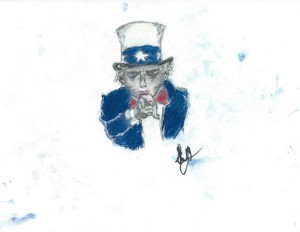Denying refugees denies the idea of America
New group of political ‘Know Nothings’ is too willing to give in to fear
In the 1840s and 1850s, Irish and German Catholic immigrants, fleeing war, oppression, and famine, came in waves to the United States. In response to this, many white Protestant males formed the American Native party, later the “American” party. They carried on their society’s activities in semi-secret; if asked, they said they did not know anything about such a party or its activities. Hence, their popular nickname: the “Know Nothings.” I know this because one of the nation’s first race riots took place when a group of “Know Nothings” tried to burn down the Irish Catholic church in Lowell, Mass., where I grew up. Today, faced with millions of displaced people and refugees resulting from our own overturn of all the tables in the Middle East in the last decade, we are once again seeing the growth of fear and nativist sentiment to block any and all doors to taking in these sorry fruits of our own policies. How little times have changed.
More than half of the governors of this nation, Texas’ Greg Abbott among them, have now decided they get to set their own immigration policies and have announced they will “refuse” refugees from Syria if they are resettled here. That is a shame. You would think in the state that took in Jim Bowie, a known real estate speculator and duelist, there would be a little tolerance for women and children looking to not be the next casualty of ISIL. But hey, what do I know? I just live here. I just figure that since these people are trying to leave the very folks we are fighting, then it makes a certain sense we should welcome them here, in the same way Texas has normally tried to welcome strangers, and in the same way Scripture and history tell us to do.
It is a shame because the very thing that breeds resentment and seething anger in young people is being forced to see their families live in grinding misery in refugee camps. I know this because I saw it when I served in Bosnia after that ugly civil war. I cannot think of a better recruiting ground for ISIL than the camps holding millions of people who are right now sitting in Turkey, Jordan and Iraq. Their dreams of getting to either Europe or the United States are on hold because of the wave of fear that events like the Paris attacks and our most recent mass shooting in the United States produced. I might add that those Muslim countries in and around ISIL’s stronghold are at war with that group as well, and right now are bearing the burden to a far greater degree than we are in this country.
Fear does not require rational sense, nor does it produce rational responses. Fear is the victory of groups like ISIL. Fear is their food; it is their drink. Fear is what they want most of all, because fear makes a relatively small group of people like al-Qaeda or ISIL seem much stronger than they truly are.
Fear lets a few rule many, and fear is exactly what much of our so-called political leadership is giving these groups in the hopes of looking “strong” in the face of terrorism. By denying succor and refuge to those least able to fight back against the ISILs of the world, we deny ourselves and we deny what we as Americans are supposed to be to this world. We are either a beacon of hope and freedom, or we are not. We are either a nation that embraces the widows and orphans of the world or we are moral cowards, making a bogeyman out of a group of fanatics that will never topple us.
We Americans have hunted down and captured or killed thousands of al-Qaeda, including the man who founded them. ISIL is not unique, and though we may have to take some blame for helping create them by ill-advised actions in Iraq, we will isolate, contain and eventually beat them as long as we can show the world that they should not fear these mad pursuers of a fantasy caliphate that no one wants.
This is a group whose greatest military “accomplishments” have been executing aid workers who wanted to help feed the people ISIL oppresses. It is a group whose leaders boast about being able to kill innocent people who wanted to dine and dance in Paris. They will fall beneath our bombs and tanks and soldiers just like everyone else. They will only gain strength if the new “Know Nothings” in our political world use fear to keep us from doing what we should do as a people – morally, legally and historically. We are battling an idea in this struggle, and the power of the idea of America can only stay strong if we ourselves still believe in it.
These new “Know Nothings” who would exclude refugees from our common enemy are not our friends or protectors; they are the duped, unwitting allies of those who would strike fear into our hearts. They do not represent us as a people, and we should not let them speak for us. America is the world’s best hope. Let us live up to that, and not down to the frightened wailing of our modern “Know Nothings.”
Pat McCann is a local attorney and HCCLA past-president.




 This year’s HCCLA Toy Drive, organized by
This year’s HCCLA Toy Drive, organized by 